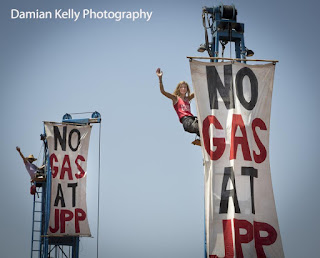When I found the motivation to drag myself away from the couch on the verandah, it was usually to go to a gig. Ahhh, Freo gigs - how I miss you.
I'd hop on the pushy and roll in the last light over the old traffic bridge. The golden sun sank into the ocean, leaving the black outline of the stacks of containers and mechanical dinosaurs at the port, and the train rattling by with a handful of straggling commuters on board, and the swirling Swan River below me all continuing their business in the darkening evening.
Mojo's was the venue most nights. Bright on the outside, gloomy and dark on the inside, I leaned against a wall to watch the band. Barefooted Charlie Parr with his big grey beard and tangled grey hair played his frantic hillbilly tunes to a baying crowd. I saw local reggae dub maestros The Sunshine Brothers quite a few times, including one of the last nights before I left town. They joked with each other in between songs as though nobody was listening.
Down opposite the abandoned Woolstores, with all the graffiti and where the kids skate all weekend, is Clancy's Fish Pub. Full of friendly vagrants and colourful eccentrics, you can't feel out of place there. Free gigs on Friday nights and a variety of tasty beers to drink and seafood to soak it up with. The T Shirts they sell say We put the beer of God in you, and it could be true.
Summer Sunday afternoons found me on the shady lawns of the Freo Art Centre. Free gig from two til four. People lay on picnic rugs sharing bowls of nuts and cold beer from the esky, gurgling toddlers escaped the half hearted grasp of dad to run around and dance up the front, the acoustic tunes floated up and around and into the trees and people smiled at each other. In my memory it was pretty much paradise.
There were so many more venues - world music upstairs at Kulcha, where you can step outside to lurk on the balcony and watch the drunks stumble round on the main street below, indie tunes in the cramped Norfolk Basement, Gomez rocking at the Fly By Night Club, comfy retro lounges to sprawl in at the Little Creatures Loft (continuing the local knack for a catchy phrase with their slogan Open Up A Little), the Blues and Roots Festival in the park - oh the music flows richly in Freo.

























































